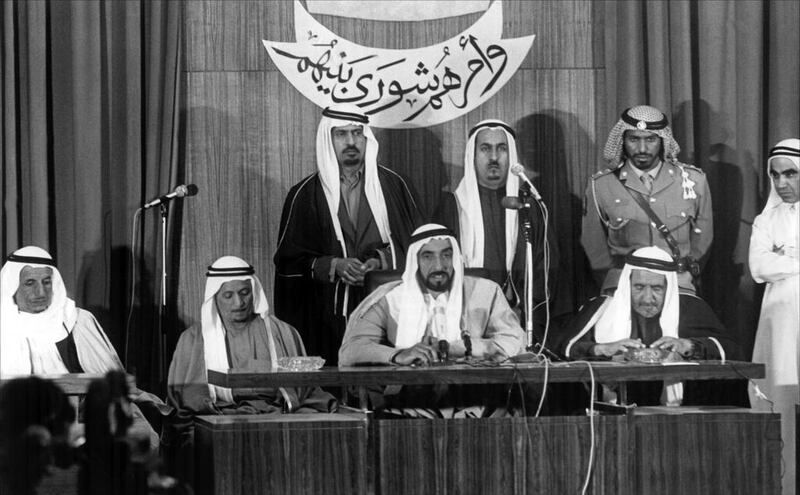For the past 44 years, the country’s apex consultative body has helped in resolving issues that concerned the public. Besides performing its legislative role, the council has ensured that the country stuck to the ideals of its Founding Father. Haneen Dajani reports
ABU DHABI // The Federal National Council had a role to play in the establishment of the country’s system of government and its laws after the emirates united.
Since its inception in 1972, the council’s members worked closely with the Founding President, Sheikh Zayed, to resolve issues that concerned the public.
In more than four decades, the FNC had created “an exceptional relationship between federal authorities, and upgraded the legislative system, and strengthened the executive authorities”, said Dr Amal Al Qubaisi, the council’s first female Speaker.
“Topping that [is] the country’s determination in returning its three islands Greater Tunb, Lesser Tunb and Abu Musa,” she continued, “and to propose ambitious objectives to support parliamentary work in the Gulf, Arab, Muslim and international arena.”
The council, Dr Al Qubaisi said, passed through two important stages – the foundation stage from 1972 to 2004, and the stabilisation stage launched by President Sheikh Khalifa that formed “a new station and a turning point in the legacy of the FNC by electing half of its members and including women as electors and members”.
Chief Justice Ahmad Al Khateri, a council member from 1997 to 2011, described the council’s role throughout its history.
“The role of the council was always active in discussing draft laws, policies of recommendations,” he said.
Since the early days, the members “understood that the most important aspect of the council’s work [was] to maintain national welfare”.
“Therefore, it maintained a moderate line, unlike divisions and unnecessary political congestions that occur in some countries and delay development.”
During the first 10 years, the council took a mostly legislative role by passing 129 draft bills – with the first being the law of the UAE emblem, which was passed on April 12, 1972.
That was followed with draft bills on the official gazette, the Union’s flag, the Armed Forces, and authorities of ministries and ministers.
In the same year, the council also passed draft law 9 that made private schools subject to the regulation of the Ministry of Education, followed by law 10 on academic scholarships.
Mr Al Khateri said education was a major issue discussed during his time on the FNC.
“I remember how my colleagues and I worked as a team, focusing on issues that concern nationals, such as education and evaluating educational policies.
“Also, one very important task was evaluating public jobs and services, which is now referred to as human resources.”
In fact, the first general issue discussed by the FNC was “surpassing academic qualifications and filling public posts with qualified Emiratis”.
During the first decade alone, the council discussed 107 general issues.
Sheikh Zayed was not only accessible to members when needed, but he followed their work and attended sessions regularly.
On April 29, 1975, he paid the council a surprise visit, during which he pledged and requested “complete frankness” from the members.
In its second year, the council started to extend its relations abroad as it conducted its first foreign visit, to the Syrian parliament in December, and joined the international parliament in 1977 and the Islamic world parliament in 1999.
“I contributed in founding the Islamic world parliament,” Mr Al Khateri said. “It was a diplomatic parliamentary exercise which flowed with the religious moderate approach of the UAE.”
One of the key recommendations made by the FNC was establishing the Marriage Fund to encourage Emiratis to settle, work and develop their nation’s “human resources”.
This recommendation was made during the first session held after the council moved from Qasr Al Hosn to its current headquarters in downtown Abu Dhabi in June 1989.
The council carried on its role in revising new and updated draft laws. In 2006, it passed the human trafficking law – a landmark initiative.
Last year, the council passed the country’s first child-protection law, following a three-day debate.
Some amendments were made with the backing of the Minister of Social Affairs, Mariam Al Roumi. Most references to religion in the law were removed to escape any possible implications to “Muslims and non-Muslims”.
The FNC has been generous with providing all the time needed to thoroughly debate any issue or draft bill at hand.
While discussing the commercial companies draft bill, the longest session in the council’s history took place.
The session extended beyond four days and members made sure the law would help in developing a work environment and restructuring companies in conformity with global changes. In general, the law provided greater opportunities for investors to start companies by offering a variety of legal options.
hdajani@thenational.ae






